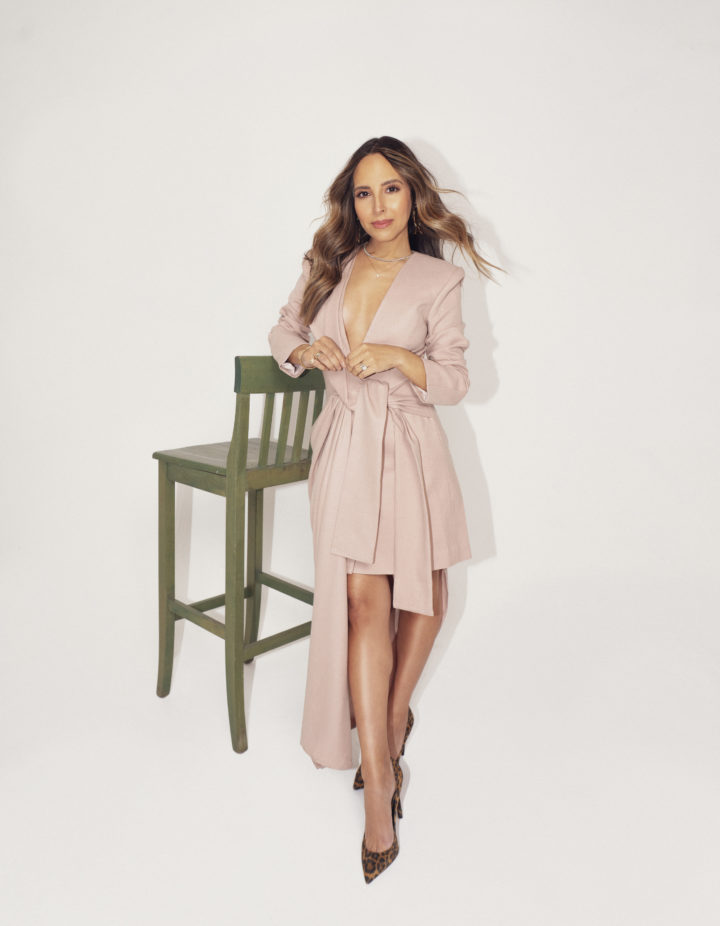Lilliana Vazquez, style expert, host of ‘E! News,’ founder of The LV Guide, and advocate for maternal wellness, gave birth to baby boy Santiago (Santi for short) last summer after battling six years of infertility struggles. She shared with Babe how therapy during pregnancy prepared her for the major life shift that is new motherhood. She provides keen advice on mental health for all women, whether you’re a mother or not.
Babe: You battled six years of infertility struggles before getting pregnant with your son. What was that journey like?
Lilliana: I chose to keep my journey very private. I didn’t want to have to advocate for myself in really difficult conversations. It felt very isolating keeping it to myself.
Your partner can be supportive, but you are the one going through it. I didn’t tell my story until I was six months pregnant, and it felt really lonely and shameful.
When you’re someone who prioritizes your career and relationship and traveling and experiences, you feel guilty and start questioning, “Would I have started a family sooner?” Especially in my community where Latinos talk about everything, it felt confusing not to be able to share my story. So I thought, if I’m feeling this way, I can’t be the only one. What about the families that are more conservative? Culturally, we don’t have these conversations. How can I be a catalyst to change the stigma?
Babe: You’ve shared how crucial working on yourself was during pregnancy. Can you explain how going to therapy helped you prepare for motherhood?
Lilliana: I’ve always believed in the power of therapy. My husband and I went through a very difficult time about three years ago.
I don’t know if I would have made it onto the other side without that therapy — in my relationship with my husband and for me as an individual.
In my first trimester, I would wake up every day and think, “Is today the last day I’m going to be pregnant?
Is today going to be the day?” I was crying all the time, and was so depressed. No one knew I was pregnant, so again, I was going through this alone, too. Why couldn’t I find joy in this miracle that I battled with for six years?
Then, as I entered my second trimester, I promised to give myself a plan and an outlet through therapy, which my therapist was my partner through all of it. In addition to adjusting to pregnancy, I’m mourning the loss of my constant of 15 years with my husband. Why don’t people talk about that? I love spending time alone, I love shopping by myself, I love watching the Housewives. When am I going to get back to that? If I don’t, will I ever be okay? You feel uncomfortable, but those feelings can coexist — that is what therapy does — shows you those feelings are a necessary part of the process.
Most importantly, I know if I’m not okay, my baby won’t be okay. Having a therapist was really liberating in what I’m advocating for as a woman and a mom. Being able to talk through those feelings has made me very strong in my convictions.
Babe: What scares you the most about being a mom?
Lilliana: I’m scared of being a terrible parent, like feeding him the wrong thing or losing my patience. I tend to be short with myself and with my husband. As someone who is fiercely independent, it’s a hard, hard process.
Babe: What do you want women (new moms especially) to know about major life transitions, like motherhood?
Lilliana: We have this fairytale and fantasy version of big moments in our life. When reality doesn’t align with fantasy, we feel less than. That’s what I think about IVF (in vitro fertilization).
We’re sold a fantasy around pregnancy and around marriage and it’s just not real. Once we start to break that down, we create space for acceptance.


